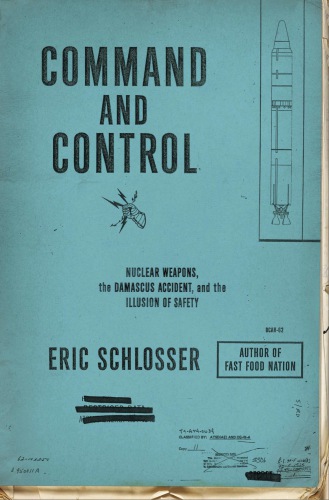
Command and Control
Nuclear Weapons, the Damascus Accident, and the Illusion of Safety
کتاب های مرتبط
- اطلاعات
- نقد و بررسی
- دیدگاه کاربران
نقد و بررسی

Starred review from July 15, 2013
In 1980 in rural Damascus, Ark., two young Air Force technicians (one was 21 years old, the other 19) began a routine maintenance procedure on a 103-foot-tall Titan II nuclear warhead–armed intercontinental ballistic missile. All was going according to plan until one of the men dropped a wrench, which fell 70 feet before hitting the rocket and setting off a chain reaction with alarming consequences. After that nail-biting opening, investigative reporter Schlosser (Fast Food Nation) goes on to tell the thrilling story of the heroism, ingenuity, mistakes, and destruction that followed. At intervals, he steps back to deliver an equally captivating history of the development and maintenance of America’s nuclear arsenal from WWII to the present. Though the Cold War has ended and concerns over nuclear warfare have mostly been eclipsed by the recent preoccupation with terrorist threats, Schlosser makes it abundantly clear that nukes don’t need to be launched to still be mind-bogglingly dangerous. Mixing expert commentary with hair-raising details of a variety of mishaps, the author makes the convincing case that our best control systems are no match for human error, bad luck, and ever-increasing technological complexity. “Mutually assured destruction” is a terrifying prospect, but Schlosser points out that there may be an even more frightening possibility: self-assured destruction. Agent: Tina Bennett, WME Entertainment.

Starred review from August 1, 2013
The chilling, concise history of America's precarious nuclear arsenal. Investigative journalist Schlosser's (Reefer Madness: Sex, Drugs, and Cheap Labor in the American Black Market, 2003, etc.) vivid and unsettling treatise spreads across a 70-year span of the development and control of nuclear weaponry. At the core of the author's scrutiny is the suspensefully narrated back story of the Arkansas-based Titan II military missile silo. A disastrous mishap in 1980 involving an accidentally punctured fuel tank caused a near-detonation and collapse of the missile, killing a young repairman and sparking an investigation into the hazardous nature of all military nuclear armaments. Schlosser frames this incident around four decades of the Cold War, the Eisenhower and Truman administrations, the Cuban missile crisis, the bravery of servicemen like Gen. Curtis LeMay, and the eerily accurate predictions and statistical determinations of nuclear strategist Fred Ikle. Testimony from a massive list of scientists and engineers further elucidates what Schlosser considers to be the nation's perpetual military defense conundrum: "the need for a nuclear weapon to be safe and the need for it to be reliable." Throughout, he chillingly extrapolates the long-standing history of nuclear near-misses with the engagement of a fiction writer. He also examines the heavily endorsed anti-nuclear foreign policies proselytized by politicians and probes the operational processes of nuclear missiles and warheads, though the specter of decimation at the hands of a weapon of mass destruction looms over each chapter. With this cautionary text, Schlosser, who pinged processed food and the underground economy onto America's cultural radar, succeeds in increasing awareness for more stringent precautions and less of the casual mismanagement of nuclear weapons. Furthermore, he respectfully memorializes those Cold War heroes (and countless others, like nuclear weapon safety lobbyist Bob Peurifoy) who've prevented nuclear holocausts from being written into the annals of American history. An exhaustive, unnerving examination of the illusory safety of atomic arms.
COPYRIGHT(2013) Kirkus Reviews, ALL RIGHTS RESERVED.

Starred review from September 15, 2013
Best-selling author Schlosser (Fast Food Nation) explores the history of America's attempts to make its nuclear weapons available for the purposes of deterrence while still safely storing them. The record, according to Schlosser, is very mixed, with thousands of minor to major accidents over the past 60 years. He recounts the major accident involving an armed nuclear missile silo in Damascus, AR, in September 1980, to show how complicated systems involving human actors inevitably fail and can easily result in catastrophe. Basing his conclusions on extensive interviews with those involved in the Damascus incident and many others, as well as on recently declassified records, Schlosser emphasizes that the U.S. military's demands for reliable nuclear weapons have prevailed over the concerns of weapon designers and civilian leadership about the need for safe weapons storage that would ensure low risk of accidental detonation. While Americans found intentional nuclear war a frightening prospect during the Cold War, accidental nuclear disasters were an unrecognized danger. VERDICT This is a welcome addition to a field dominated by books by nuclear-weapons and strategy experts. It will appeal to a general audience as an engrossing read about Cold War history as well as to those interested in nuclear weapons and U.S. national defense policy.--Mark Jones, Mercantile Lib., Cincinnati
Copyright 2013 Library Journal, LLC Used with permission.

September 1, 2013
Nuclear bombs must be handled with the proper care, yet that is not always the case. Mentioning harrowing mishaps in the history of the American atomic arsenal, Schlosser singles out one for detailed dramatization, the explosion in 1980 of a Titan II missile. Some airmen were killed and injured, but since the warhead didn't detonate, the safety system appeared to have worked. Color Schlosser skeptical, for, as he recounts this accident, which began with a mundane incidenta dropped tool that punctured the missilehe delves into nuclear weapon designs. Those are influenced by the requirement that the bomb must always detonate when desired and never when not. Citing experts in the technology of nuclear weaponry who have pondered the never part of the requirement, Schlosser highlights their worry about an accidental nuclear explosion. Underscored by cases of dropped, burned, and lost bombs, the problem of designing a safe but reliable bomb persists (see also The Bomb, 2009, by weapons engineer Stephen Younger). Well researched, reported, and written, this contribution to the nuclear-weapons literature demonstrates the versatility of Schlosser, author of Fast Food Nation (2001).(Reprinted with permission of Booklist, copyright 2013, American Library Association.)

























دیدگاه کاربران